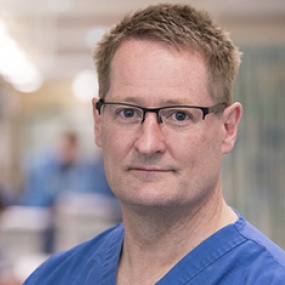Introducing the Centre for Perioperative Care – how we can all get involved for patient benefit

Director for the Centre of Perioperative Care, Co-opted Member of Council representing CPOC
It has been a busy first month since my appointment as the inaugural Director of the Centre for Perioperative Care (CPOC) hosted at the Royal College of Anaesthetists. Apart from ‘who are you?’ the two questions that I get asked the most by clinicians are;
- what is CPOC?
- what does it mean for me and my patients?
To deal with the question about me; I have been a consultant at Nottingham University Hospitals NHS Trust for over 20 years, becoming first a College Tutor then as a Regional Advisor for eight years. Following this I moved into a variety of leadership and managerial roles originally as a Head of Service (Lead Clinician), followed by a number of clinical director roles and appointment as a Divisional Director. In 2018, I was appointed as the Trust’s Deputy Medical Director. To bring the story completely up to date, I am just about to embark on an MD secondment role to the nearby Sherwood Forest Hospitals NHS Foundation Trust. My wider system roles have been as the lead acute care clinician designing a clinical services strategy for our accelerated integrated care system and nationally co-opted to College Council for the last six years as Chairman of the Clinical Directors’ Network.
So, what is CPOC?
CPOC is dedicated to the promotion, advancement and development of all aspects of perioperative care. The Centre will facilitate closer and more effective cross-organisational working, leading change of inpatient pathways and integrating services through a multi-disciplinary team approach. The Centre will build on the large amount of work already undertaken by the College’s perioperative medicine work streams and the Perioperative Quality Improvement Programme (PQIP); establish structure and processes to help deliver this ambitious and exciting change for the benefit of our patients. By achieving this, CPOC will comply with the NHS triple aim of delivering a high quality service with better patient outcomes, better patient experiences and better and more efficient use of resources.
CPOC is dedicated to the promotion, advancement and development of all aspects of perioperative care
So, what does it mean for my patients?
It means reviewing and changing how we currently run the surgical perioperative pathway, it means reviewing and re-designing how we work, how our patient flows are established and how we prepare our patients for surgery and how and who decides that they are optimised for surgery. It means changing the postoperative course with increased emphasis on enhanced recovery after surgery and it means re-designing our discharge processes so that this is planned and arranged in advance of the surgical event.
But, it also means that we can design a care pathway that provides the opportunity to have important patient discussions - true shared decision-making conversations - where the focus changes from a technically possible surgical procedure, to the delivery of perioperative care that is designed and wrapped around the patient. The final decision is one that all stakeholders agree (in conjunction with the patient), is the correct course of action. This would ensure that the patient understands the risks, the likely outcomes, but also allows clinicians from various specialties to empower their patients to get in the best possible physical shape before surgery. These ‘teachable moments’ provide us, as clinicians, the opportunity to ensure that we can really start to address the prevention agenda around smoking, diabetes, obesity and exercise. Much of this has already begun with our Fitter Better Sooner programme and push for prehab to rehab model of care. CPOC has a commitment to work closely with other key stakeholders such as the Royal College of Physicians, Royal College of Surgeons, Royal College of Nursing, Royal College of General Practitioners, Association of Anaesthetists and other partners to co-ordinate perioperative care initiatives across the health and social care landscape. CPOC will also work with other partners such as NHS England and the devolved nations’ health initiatives such as Realistic Medicine in Scotland and Prudent Healthcare in Wales.
So, what does it mean for us as clinicians?
To many within the College, perioperative care is an expansion of the work we are currently undertaking as anaesthetists, pain management clinicians and critical care physicians. That said, others do see this as outside their normal working remit and a significant step change. What I would say is that CPOC does provide us with an opportunity to become more involved in directing and delivering optimal and excellent patient care throughout the whole surgical journey. Furthermore, it allows us the opportunity to work with primary care and social care on modifying disease processes and optimising physiology perioperatively and to help shape best practice, research and future developments. It also gives us all the chance to become a fully integrated part of the shared decision making team, central to the planning of the surgical event and key in the perioperative management as part of a multi-specialty and integrated multidisciplinary pre and post-operative management team. Finally, it provides that rare opportunity to deliver truly transformational change across all four nations.
If you would like to get involved in the delivery of perioperative care within your hospital or Trust, I encourage you to get in touch with us via email (cpoc@rcoa.ac.uk) and follow us on twitter @CPOC_News.
Dr Dave Selwyn
